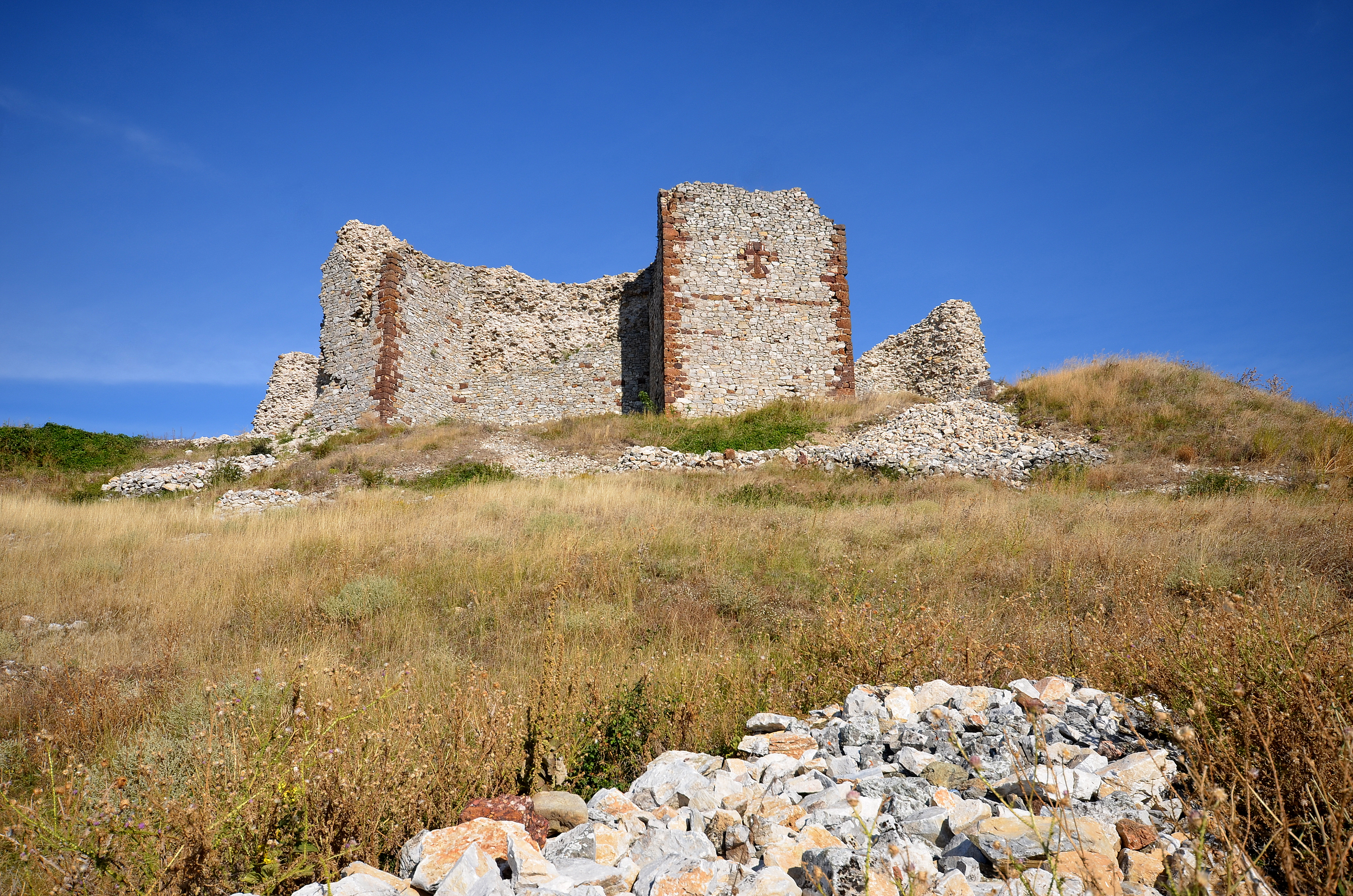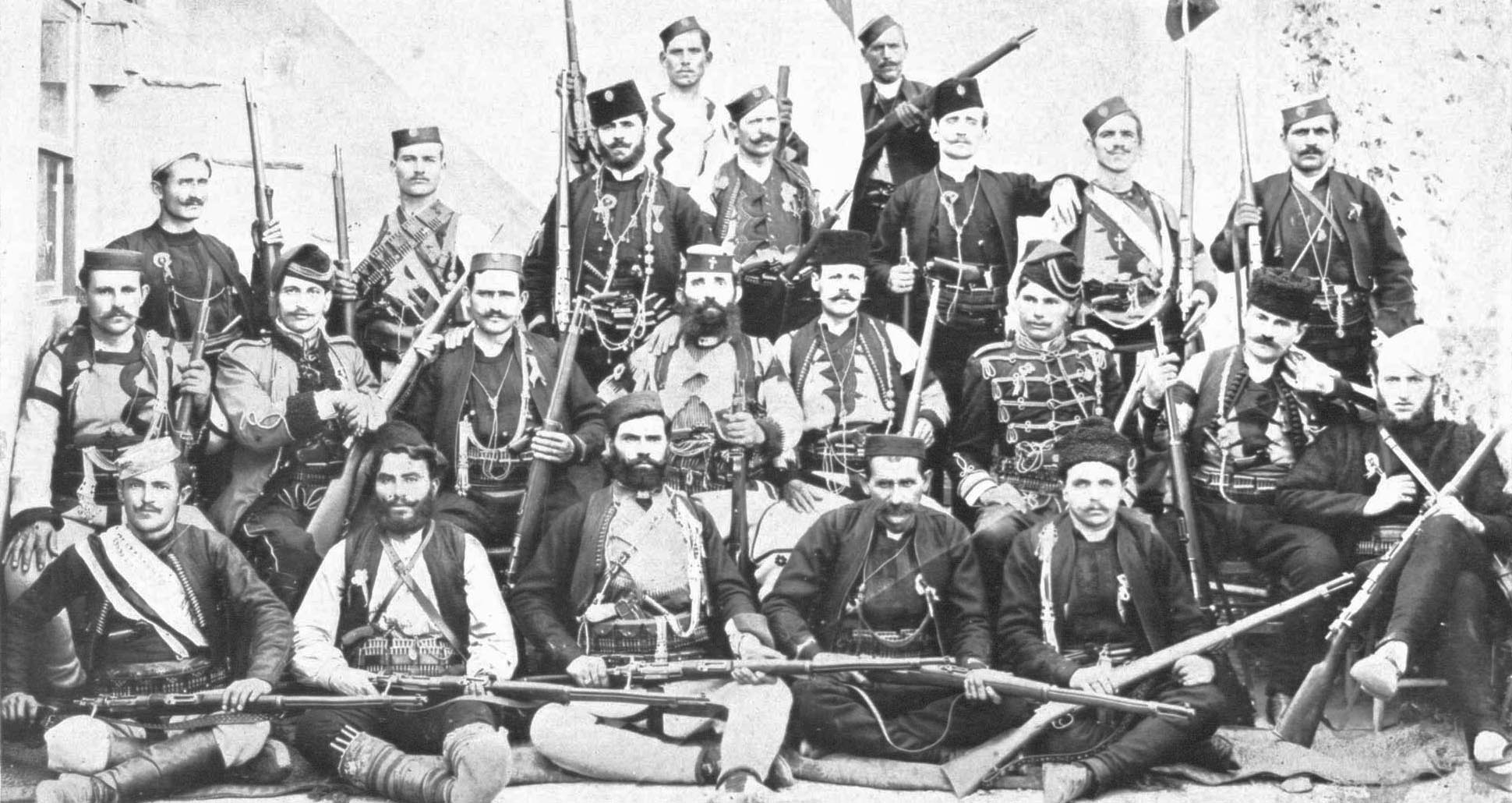|
Sava Petrović-Grmija
Sava Petrović ( sr-cyr, Сава Петровић, 23 July 1882 – 28 October 1914), known as Sava Grmija (Сава Грмија), was a Serbian soldier, member of the Serbian Chetnik Organization and participant in the Balkan Wars and World War I. Life Petrović was born in the vicinity of Pristina, by the Germia mountain, at the time part of the Sanjak of Sjenica (now Kosovo). He finished Serbian secondary school in Pristina, and five years of gymnasium in Skopje and Thessaloniki. In 1905 he fled to the Kingdom of Serbia and entered into the 2nd Infantry Regiment "Knjaz Mihailo" in Niš. After a year, he also entered and finished the Military Academy in Belgrade, after which he served as a sergeant (''vodnik'') in the 12th Infantry Regiment "Tsar Lazar" in Kruševac. In 1906 he joined the Serbian Chetnik Organization and fought in the Poreče region, after which he was appointed Chief of Upper Staff at the beginning of 1907. His ''nom de guerre'' was ''Grmija''. In the First ... [...More Info...] [...Related Items...] OR: [Wikipedia] [Google] [Baidu] |
Pristina
Pristina, ; sr, / (, ) is the capital and largest city of Kosovo. The city's municipal boundaries in Pristina District form the largest urban center in Kosovo. After Tirana, Pristina has the second largest population of ethnic Albanians and speakers of the Albanian language. Inhabited by humans since prehistoric times, the area of Pristina was home to several Illyrian peoples. King Bardyllis of the Dardanians brought various tribes together in the 4th century BC and established the Dardanian Kingdom.''The Cambridge Ancient History: The fourth century B.C.'' Volume 6 of The Cambridge Ancient History Iorwerth Eiddon Stephen Edwards, , , Authors: D. M. Lewis, John Boardman, Editors: D. M. Lewis, John Boardman, Second Edition, Cambridge ... [...More Info...] [...Related Items...] OR: [Wikipedia] [Google] [Baidu] |
Novo Brdo
Novo Brdo ( sr-Cyrl, Ново Брдо), or Novobërda and Artana ( sq-definite, Novobërdë or ''Artanë''), is a municipality located in the Pristina district of Kosovo. According to the 2011 census, it has a population of 6,729 inhabitants. The center of the municipality is the village of Bostane. After the 2013 Brussels Agreement, the municipality became part of the Community of Serb Municipalities. Name In Serbian (and also English) "Novo Brdo" is used, literally meaning "New Hill". The name was derived from the medieval Serbian mining town of Novo Brdo. In Albanian, "Novobërdë" or "Artanë" is used. History Middle Ages Novo Brdo is an archaeological site. Novo Brdo was mentioned with its present name in historical documents as early as 1326. Previously it was known as ''Novus Mons'' or ''Novamonte'' in Latin and as ''Nyeuberghe'' in Saxon texts. The famous scribe Vladislav the Grammarian was born here. Ragusan documents attest to the presence of a significant num ... [...More Info...] [...Related Items...] OR: [Wikipedia] [Google] [Baidu] |
Kosovo Serbs
Kosovo Serbs are one of the ethnic groups of Kosovo. There are around 100,000 Kosovo Serbs as of 2014 and about half of them live in North Kosovo. Other Serb communities live in southern Kosovo. After Albanians, they form the largest ethnic community in Kosovo (4-7%). The medieval Kingdom of Serbia (1217–1346) and the Serbian Empire (1346–1371) included parts of the territory of Kosovo until its annexation by the Ottomans following the Battle of Kosovo (1389), considered one of the most notable events of Serbian history. Afterwards, it was a part of the Serbian Despotate. Modern Serbian historiography considers Kosovo in this period to be the political, religious and cultural core of the medieval Serbian state. In the Ottoman period (1455-1913), the situation of the Serbian population in Kosovo went through different phases. In the 16th century, the Serbian Patriarchate of Peć was re-established and its status strengthened. At the end of 18th century, the support of the P ... [...More Info...] [...Related Items...] OR: [Wikipedia] [Google] [Baidu] |
Military Personnel From Pristina
A military, also known collectively as armed forces, is a heavily armed, highly organized force primarily intended for warfare. It is typically authorized and maintained by a sovereign state, with its members identifiable by their distinct military uniform. It may consist of one or more military branches such as an army, navy, air force, space force, marines, or coast guard. The main task of the military is usually defined as defence of the state and its interests against external armed threats. In broad usage, the terms ''armed forces'' and ''military'' are often treated as synonymous, although in technical usage a distinction is sometimes made in which a country's armed forces may include both its military and other paramilitary forces. There are various forms of irregular military forces, not belonging to a recognized state; though they share many attributes with regular military forces, they are less often referred to as simply ''military''. A nation's military may f ... [...More Info...] [...Related Items...] OR: [Wikipedia] [Google] [Baidu] |
Serbian Military Personnel Killed In World War I
Serbian may refer to: * someone or something related to Serbia, a country in Southeastern Europe * someone or something related to the Serbs, a South Slavic people * Serbian language * Serbian names See also * * * Old Serbian (other) * Serbians * Serbia (other) * Names of the Serbs and Serbia Names of the Serbs and Serbia are terms and other designations referring to general terminology and nomenclature on the Serbs ( sr, Срби, Srbi, ) and Serbia ( sr, Србија/Srbija, ). Throughout history, various endonyms and exonyms have bee ... {{Disambiguation Language and nationality disambiguation pages ... [...More Info...] [...Related Items...] OR: [Wikipedia] [Google] [Baidu] |
Serbian Military Personnel Of World War I
Serbian may refer to: * someone or something related to Serbia, a country in Southeastern Europe * someone or something related to the Serbs, a South Slavic people * Serbian language * Serbian names See also * * * Old Serbian (other) * Serbians * Serbia (other) * Names of the Serbs and Serbia Names of the Serbs and Serbia are terms and other designations referring to general terminology and nomenclature on the Serbs ( sr, Срби, Srbi, ) and Serbia ( sr, Србија/Srbija, ). Throughout history, various endonyms and exonyms have ... {{Disambiguation Language and nationality disambiguation pages ... [...More Info...] [...Related Items...] OR: [Wikipedia] [Google] [Baidu] |
Serbian Military Personnel Of The Balkan Wars
Serbian may refer to: * someone or something related to Serbia, a country in Southeastern Europe * someone or something related to the Serbs, a South Slavic people * Serbian language * Serbian names See also * * * Old Serbian (other) * Serbians * Serbia (other) * Names of the Serbs and Serbia Names of the Serbs and Serbia are terms and other designations referring to general terminology and nomenclature on the Serbs ( sr, Срби, Srbi, ) and Serbia ( sr, Србија/Srbija, ). Throughout history, various endonyms and exonyms have bee ... {{Disambiguation Language and nationality disambiguation pages ... [...More Info...] [...Related Items...] OR: [Wikipedia] [Google] [Baidu] |
Chetniks Of The Macedonian Struggle
The Chetniks ( sh-Cyrl-Latn, Четници, Četnici, ; sl, Četniki), formally the Chetnik Detachments of the Yugoslav Army, and also the Yugoslav Army in the Homeland and the Ravna Gora Movement, was a Kingdom of Yugoslavia, Yugoslav royalist and Serbian nationalist movement and Guerrilla warfare, guerrilla force in Axis powers, Axis-occupied Yugoslavia. Although it was not a homogeneous movement, it was led by Draža Mihailović. While it was anti-Axis in its long-term goals and engaged in marginal resistance activities for limited periods, it also engaged in tactical or selective Collaborationism, collaboration with the occupying forces for almost all of the war. The Chetnik movement adopted a policy of collaboration with regard to the Axis, and engaged in cooperation to one degree or another by establishing ''modus vivendi'' or operating as "legalised" auxiliary forces under Axis control. Over a period of time, and in different parts of the country, the movement was progre ... [...More Info...] [...Related Items...] OR: [Wikipedia] [Google] [Baidu] |
Serbian Soldiers
Serbian may refer to: * someone or something related to Serbia, a country in Southeastern Europe * someone or something related to the Serbs, a South Slavic people * Serbian language * Serbian names See also * * * Old Serbian (other) * Serbians * Serbia (other) * Names of the Serbs and Serbia Names of the Serbs and Serbia are terms and other designations referring to general terminology and nomenclature on the Serbs ( sr, Срби, Srbi, ) and Serbia ( sr, Србија/Srbija, ). Throughout history, various endonyms and exonyms have bee ... {{Disambiguation Language and nationality disambiguation pages ... [...More Info...] [...Related Items...] OR: [Wikipedia] [Google] [Baidu] |
List Of Chetnik Voivodes
This is a list of Chetnik voivodes. VoivodeAlso spelled "voievod", "woiwode", "voivod", "voyvode", "vojvoda", or "woiwod" () ( Old Slavic, literally "war-leader" or "war-lord") is a Slavic as well as Romanian title that originally denoted the principal commander of a military force. It derives from the word ''vojevoda'', which in early Slavic meant the ''bellidux'', i.e. the military commander of an area, but it usually had a greater meaning. Among the first modern-day voivodes was Kole Rašić, a late 19th-century Serb revolutionary and guerrilla fighter, who led a cheta of 300 men between Niš and Leskovac in Ottoman areas during the Serbo-Turkish War (1876–1878). The others were Rista Cvetković-Božinče, Čerkez Ilija, Čakr-paša, and Spiro Crne. Jovan Hadži-Vasiljević, who knew Spiro Crne personally, wrote and published his biography, ''Spiro Crne Golemdžiojski'', in 1933. Commanders of Old Serbia and Macedonia (1903–1912), Balkan Wars * Kosta Milovanović-P ... [...More Info...] [...Related Items...] OR: [Wikipedia] [Google] [Baidu] |
Gučevo
Gučevo ( sr-Cyrl, Гучево, ) is a mountain in western Serbia, near the town of Loznica, overlooking the Drina river and Banja Koviljača. Its highest peak ''Crni vrh'' has an elevation of 779 meters above sea level. The mountain was a site of Battle of Gučevo between Serbian and Austro-Hungarian army in World War I World War I (28 July 1914 11 November 1918), often abbreviated as WWI, was one of the deadliest global conflicts in history. Belligerents included much of Europe, the Russian Empire, the United States, and the Ottoman Empire, with fightin .... At the top of the mountain there is a monument to Serbian and Austro-Hungarian soldiers. References External linksBiking tour over Gučevo Mountains of Serbia {{serbia-geo-stub ... [...More Info...] [...Related Items...] OR: [Wikipedia] [Google] [Baidu] |


